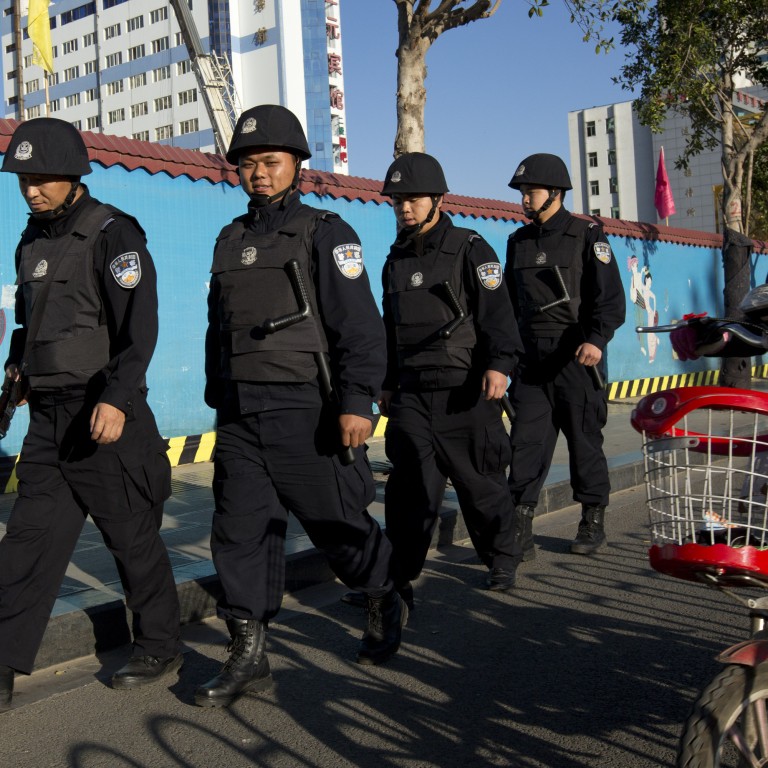
Update | Trepidation and heavy police presence in Kunming Uygur neighbourhood after weekend massacre
An Uygur community in Kunming has been placed under heavy police presence after a gory attack at the city’s main railway station by knife-wielding assailants left 29 civilians dead and more than 140 injured on Saturday night.
Residents of Dashuying, a low-rent “village-like” community in the eastern part of the city, said police officers and Swat teams had been stationed in the area since Saturday night’s horrifying attack on passengers at the railway station.
The area was rumoured to be a secondary location of “terrorists” attacks, but this was later denied by police.
On Monday, the atmosphere in Dashuying, about eight kilometres away from the Kunming train station, was tense, with the area gravely silent.
Special police forces with heavy weapons guarded every exit and have been carrying out strict identity checks since the attack on Saturday.
Policemen holding guns carried out inspections a few hours after the attack, [are] knocking on our door at 2am to ask for our IDs and they came again on Sunday and [Monday]
Ten policemen carrying long firearms entered an Uygur restaurant at around 2pm on Monday, announcing they would conduct identity checks on members of the ethnic group.
“We didn’t wish to see the attack happen, but what can we do now?” said a 47-year-old Uygur restaurant manager, adding that his business slowed after the attack. “In the past, even local government officials and tourists would come to our restaurants but now they don’t come anymore.”
“Policemen holding guns carried out inspections a few hours after the attack, [are] knocking on our door at 2am to ask for our IDs and they came again on Sunday and [Monday],” he said.
“Of course it’s not appropriate to hold us against such stringent checks. We’re also citizens of the People’s Republic of China,” he added.
“Police are everywhere on the main road and in back lanes where Uygur people live,” said a receptionist from a hotel in the area during a phone interview with the South China Morning Post. “Honestly, that’s the only way I feel safe and dare to come to work today.”
The woman said she was terrified following the attack. “I won’t go out other than to work. I won’t go to crowded places for a long time for sure.”
State media have blamed Saturday night's attack on "Xinjiang separatist forces" and branded it an act of terrorism.
A doctor at a clinic in the area said she saw police officers and Swat teams patrolling the streets, but was not aware of any door-to-door searches or arrests being made.
The Uygur restaurant manager lamented how the attack tainted the ethnic group’s standing further.
“We really hate what [the attackers] did. “They kept on … linking Uygurs and terrorism. As an Uygur, of course I feel awful,” he said. “Taking lives from the hands of innocence is not the act of a true Islamist. We are not like this.”
Many Kunming residents are refraining from going to Dashuying for fear of being attacked. But the feeling is mutual for the Uygurs in the village.
“People from Dashuying dare not to step out as well,” the restaurant manager said. “Many [locals] walk past and stare at us strangely.”
“We watch the news every day. I believe normal people will not do such things to civilians. They don’t represent all of us Uygurs. I have friends from all over the world,” he said.
Several Kunming residents described to the Post that residents of the area were mostly non-Kunming residents who worked nearby or simply lived there because of the low rent. It is not exactly a suburb but a large “urban village”.
As part of a community relations programme in 2011, police at nearby Jinma station invited Uygur residents who were fluent in Chinese to give officers lessons in the Uygur language. They also held regular talks with the Uygur community where they listened to their advice and heard their grievances, according to a report in the Kunming Daily.
Officers worked with civil affairs, health and religious authorities to find job opportunities for Uygur residents and even helped them open restaurants or send their children to school.
The campaign has lowered crime rates and reduce the number of jobless Uygur people, the report said.
Watch: China train station attack eyewitness: 'I saw five people holding knives...'


